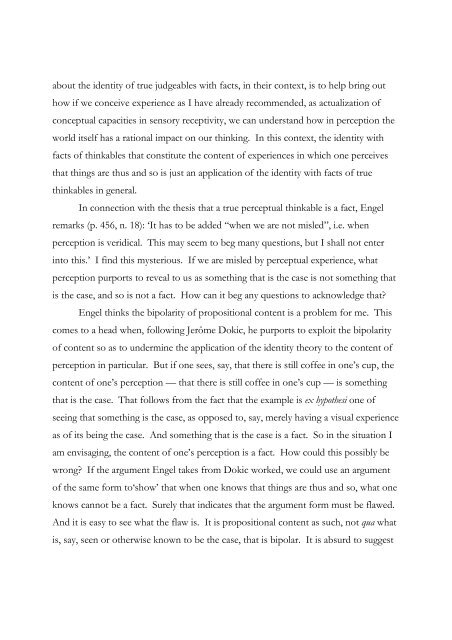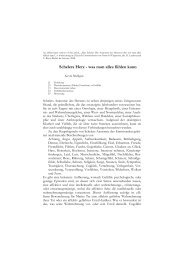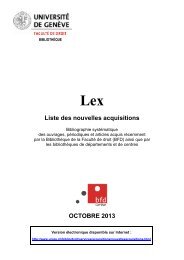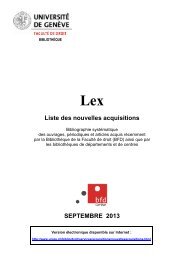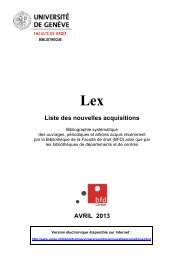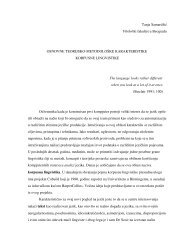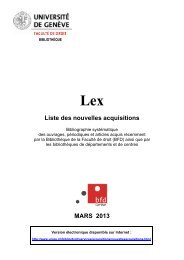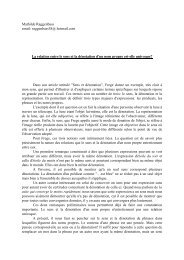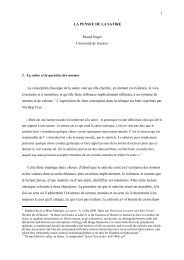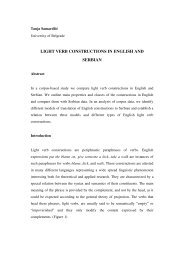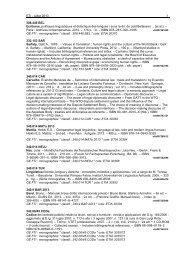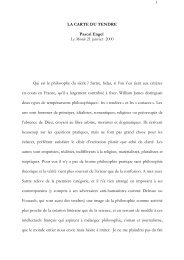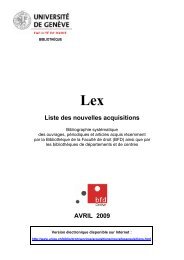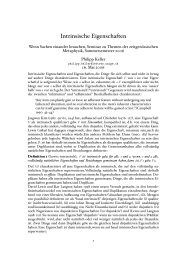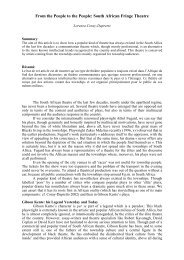2005 Unimportance of being modest A footnote to McDowel
2005 Unimportance of being modest A footnote to McDowel
2005 Unimportance of being modest A footnote to McDowel
Create successful ePaper yourself
Turn your PDF publications into a flip-book with our unique Google optimized e-Paper software.
about the identity <strong>of</strong> true judgeables with facts, in their context, is <strong>to</strong> help bring out<br />
how if we conceive experience as I have already recommended, as actualization <strong>of</strong><br />
conceptual capacities in sensory receptivity, we can understand how in perception the<br />
world itself has a rational impact on our thinking. In this context, the identity with<br />
facts <strong>of</strong> thinkables that constitute the content <strong>of</strong> experiences in which one perceives<br />
that things are thus and so is just an application <strong>of</strong> the identity with facts <strong>of</strong> true<br />
thinkables in general.<br />
In connection with the thesis that a true perceptual thinkable is a fact, Engel<br />
remarks (p. 456, n. 18): ‘It has <strong>to</strong> be added “when we are not misled”, i.e. when<br />
perception is veridical. This may seem <strong>to</strong> beg many questions, but I shall not enter<br />
in<strong>to</strong> this.’ I find this mysterious. If we are misled by perceptual experience, what<br />
perception purports <strong>to</strong> reveal <strong>to</strong> us as something that is the case is not something that<br />
is the case, and so is not a fact. How can it beg any questions <strong>to</strong> acknowledge that?<br />
Engel thinks the bipolarity <strong>of</strong> propositional content is a problem for me. This<br />
comes <strong>to</strong> a head when, following Jerôme Dokic, he purports <strong>to</strong> exploit the bipolarity<br />
<strong>of</strong> content so as <strong>to</strong> undermine the application <strong>of</strong> the identity theory <strong>to</strong> the content <strong>of</strong><br />
perception in particular. But if one sees, say, that there is still c<strong>of</strong>fee in one’s cup, the<br />
content <strong>of</strong> one’s perception — that there is still c<strong>of</strong>fee in one’s cup — is something<br />
that is the case. That follows from the fact that the example is ex hypothesi one <strong>of</strong><br />
seeing that something is the case, as opposed <strong>to</strong>, say, merely having a visual experience<br />
as <strong>of</strong> its <strong>being</strong> the case. And something that is the case is a fact. So in the situation I<br />
am envisaging, the content <strong>of</strong> one’s perception is a fact. How could this possibly be<br />
wrong? If the argument Engel takes from Dokic worked, we could use an argument<br />
<strong>of</strong> the same form <strong>to</strong>‘show’ that when one knows that things are thus and so, what one<br />
knows cannot be a fact. Surely that indicates that the argument form must be flawed.<br />
And it is easy <strong>to</strong> see what the flaw is. It is propositional content as such, not qua what<br />
is, say, seen or otherwise known <strong>to</strong> be the case, that is bipolar. It is absurd <strong>to</strong> suggest


